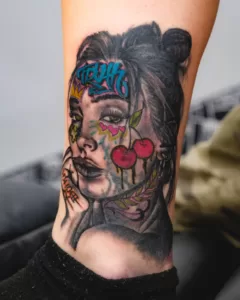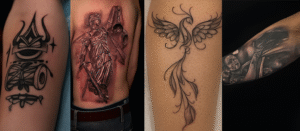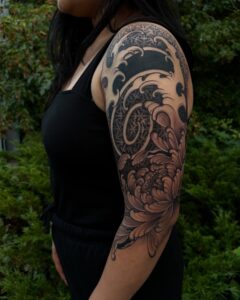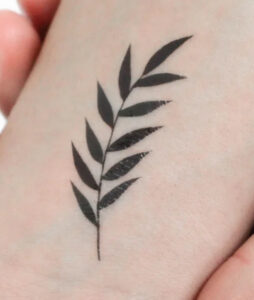Tattooing has a long and rich history in Japan, dating back thousands of years. While tattoos have been used for many purposes, from marking criminals to indicating social status, in Japan, they are most often associated with the Yakuza, the country’s notorious organized crime syndicates. However, Japanese tattoos have a deep cultural significance beyond their association with the criminal underworld. In this blog post, we’ll explore the history and meaning of Japanese tattoos and the significance of some of the most popular designs.
The History of Japanese Tattoos
 Tattooing in Japan can be traced back to at least the Jomon period (approximately 14,000 BCE – 300 BCE) when pottery figurines with tattooed faces were discovered. During the Yayoi period (300 BCE – 300 CE), tattoos were used to signify social status and were common among the ruling class. However, by the Heian period (794 – 1185 CE), tattoos had fallen out of favour and became associated with criminals and outcasts.
Tattooing in Japan can be traced back to at least the Jomon period (approximately 14,000 BCE – 300 BCE) when pottery figurines with tattooed faces were discovered. During the Yayoi period (300 BCE – 300 CE), tattoos were used to signify social status and were common among the ruling class. However, by the Heian period (794 – 1185 CE), tattoos had fallen out of favour and became associated with criminals and outcasts.
In the Edo period (1603 – 1868 CE), tattoos became popular among the working classes, particularly firefighters, who used them as symbols of bravery and strength. During this time, the traditional Japanese art of tattooing, known as Irezumi, began to take shape. Irezumi artists would use bamboo needles to hand-poke intricate designs into the skin, often taking months or even years to complete a single piece.
The popularity of tattoos in Japan continued to grow, and by the Meiji period (1868 – 1912 CE), tattoos had become a symbol of rebellion and anti-authoritarianism. This association with defiance and criminality continued into the modern era, and today, Japanese tattoos are still often associated with the Yakuza and other criminal organizations.
However, in recent years, Japanese tattoos have begun to gain wider acceptance and appreciation as a form of art and cultural expression. Many people now seek out Japanese tattoos not just for their aesthetic value but also for their deep cultural and symbolic significance.
The Meaning of Japanese Tattoos
In Japanese culture, tattoos are often used to express a particular sentiment or to commemorate an important event. Many designs are inspired by traditional Japanese art forms, such as ukiyo-e and woodblock prints, and feature motifs such as koi fish, dragons, samurai, and geisha.
One of the most popular designs in Japanese tattooing is the koi fish. In Japanese mythology, the koi fish represents perseverance and strength. Legend has it that if a koi fish can swim upstream and leap over the waterfall known as the Dragon’s Gate, it will transform into a dragon. As a result, koi fish tattoos are often used to symbolize overcoming adversity and achieving one’s goals.
Another popular design is the dragon, which is a symbol of power and strength. In Japanese culture, dragons are believed to be benevolent creatures that bring good luck and fortune. They are often depicted with a pearl, which represents wisdom and enlightenment.
Samurai tattoos are also popular, symbolizing courage, honour, and loyalty. The samurai were the warrior class in feudal Japan, and they were known for their strict code of honour, bushido. Samurai tattoos often depict samurai armour, swords, and other traditional Japanese motifs.
 Geisha tattoos are another popular design that symbolizes beauty, elegance, and femininity. Geisha were highly skilled entertainers in traditional Japanese culture, known for their artistic abilities, music, dance, and conversation. Geisha tattoos often feature intricate designs, such as fans, flowers, and other symbols associated with beauty and grace.
Geisha tattoos are another popular design that symbolizes beauty, elegance, and femininity. Geisha were highly skilled entertainers in traditional Japanese culture, known for their artistic abilities, music, dance, and conversation. Geisha tattoos often feature intricate designs, such as fans, flowers, and other symbols associated with beauty and grace.
In addition to these traditional designs, many other motifs and symbols are commonly used in Japanese tattooing. For example, the cherry blossom, or sakura, is a popular design that represents the fleeting nature of life and the impermanence of beauty. The lotus flower is another popular symbol representing purity, enlightenment, and rebirth.
Another important aspect of Japanese tattooing is the use of colour. Traditional Japanese tattoos are often brightly coloured, with bold outlines and shading. Using colour can add depth and meaning to a design, and different colours can represent different emotions or ideas. For example, red is often used to symbolize passion, while black represents strength and resilience.
While Japanese tattoos are rich in symbolism and meaning, it’s important to note that their significance can vary depending on the individual and their cultural background. For example, a dragon tattoo may have different connotations for someone who grew up in Japan than for someone from Western culture.
Tips on Getting a Japanese Tattoo
If you’re interested in getting a Japanese tattoo, there are a few things to keep in mind.
First, finding a reputable artist specializing in traditional Japanese tattooing is important. Traditional Japanese tattoos require great skill and expertise, and not all tattoo artists are trained in this style.
Having a clear idea of the design you want and what it represents is also important. Take the time to research different motifs and symbols and think about what resonates with you personally. You may want to consult with your tattoo artist to get their input and ideas, as they may be able to suggest designs that you haven’t considered.
Finally, it’s important to remember that Japanese tattoos are permanent, so it’s important to ensure you’re happy with the design and its meaning before getting inked. Take the time to think about your decision and ensure you’re comfortable with the commitment of getting a tattoo.
Conclusion
Whether you’re interested in a koi fish, dragon, samurai, or geisha tattoo, many traditional motifs and symbols exist. These designs can have different meanings and connotations depending on the individual and their cultural background, so it’s important to take the time to research and find a design that resonates with you personally.
If you’re considering getting a Japanese tattoo, make sure to find a reputable artist who specializes in this style of tattooing. Take the time to think about the design and its meaning before making a commitment, and remember that a tattoo is a permanent expression of yourself, so it’s important to choose a design that you’ll be happy with for years to come.
At 905 Ink, our team of highly skilled and experienced tattoo artists takes great pride in their work. With expertise in various genres, we are committed to continually improving our techniques and staying up-to-date with the latest tattoo trends to provide our clients with the best possible results.
Whether you visit our Brampton or Toronto studio, you’ll have the opportunity to witness the exceptional work of our talented artists and receive expert advice for your next tattoo. If you can’t make it to our studio, don’t worry. You can explore our website or Pinterest page to peruse our artists’ portfolios and find inspiration.
We understand tattoos are deeply personal and meaningful expressions of one’s identity. That’s why we’re passionate about creating tattoos that look stunning and hold personal significance for our clients. If you’re ready to start the journey toward your next unforgettable tattoo, schedule a consultation with one of our artists today.






